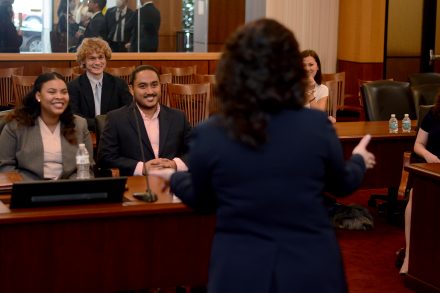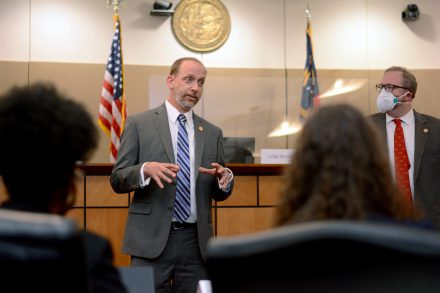The Hon. Hunter Murphy, the Hon. Toby Hampson, and the Hon. April Wood answered questions from students following oral arguments by lawyers representing the parties involved in two separate lawsuits.
For anyone with an interest in civil litigation, two cases heard this week by the North Carolina Court of Appeals posed fascinating questions.
First, there was North Carolina Farm Bureau Mutual Insurance Co. v. Carpenter: Visitors to a fair in western North Carolina fell ill with Legionnaires’ disease almost three years ago after they were exposed to hot tubs on display in the event center.
The hot tub vendors’ insurance company specifically excludes fungi and bacteria from its policies. Did the trial court make a mistake when it ruled that the insurance company still had a duty to defend its insured?
Next, you had Coastal Conservations Association v. the State of North Carolina: The public trust doctrine gives the public the right to access certain lands and waterways for activities, such as fishing, that might be regulated by the state.

A national nonprofit and dozens of recreational anglers sued the State of North Carolina in 2020 after commercial fishing reduced the regional availability of certain species. The lawsuit claimed the state had a responsibility to better regulate the fishing industry. At trial, did the court err by ruling against North Carolina’s assertion of sovereign immunity?
The Hon. Hunter Murphy, the Hon. Toby Hampson, and the Hon. April Wood will address these questions in a decision to be issued later this year following oral arguments on April 26, 2022, inside Elon Law’s Robert E. Long Courtroom.
Their visit to Elon Law – which included lunch with several Advocacy Fellows, faculty, and administrators – was the first time since the start of the COVID-19 pandemic that the Court of Appeals heard in-person arguments at the law school.
Following oral arguments, the judges returned to Elon Law’s courtroom to answer questions from students and offer advice for those with interest in appellate practice.

“Having the oral argument sessions in Elon Law’s courtroom joined legal theory with practice for our students, particularly our first-year students who are working on their appellate briefs and preparing for their own oral arguments in legal writing,” said Assistant Professor Caroleen Dineen, director of Elon Law’s Legal Method and Communication Program. “During their discussions with judges, students learned what it takes to become a judge and how to gain judicial experience through internships, Elon Law’s Residency-in-Practice Program, and clerkships.
“We are grateful to the judges and court administration for providing our students this opportunity to observe legal practice in action.”



